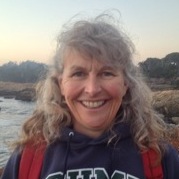Department of Applied Environmental Science
AES Professor Reflects on Her Career and What We Can Do to Make a Difference

Dr. Suzanne “Suzy” Worcester joined the CSUMB community in 1996 and is a valued faculty member in the AES Department. She has taught numerous courses in AES and other departments, and she served as the Chair of the School of Natural Sciences for many years. Outside of the classroom, Suzy can be found biking, hiking, beach walking, camping, and exploring the great outdoors.
We recently reached out to Suzy to learn more about what led her to CSUMB and her career. Check out her interview below!
What led you to CSUMB?
When the university first opened, I was excited about being part of something new and different. The thought of building a university up from scratch was also intriguing. I had been doing field work at Hopkins Marine Station in Pacific Grove and knew the ecosystems in the area. I thought it would be a fantastic place to get students excited about our wonderful, beautiful world filled with all kinds of animals and plants in the ocean, on land, in Elkhorn Slough and more.
What is your favorite part of being a professor?
Seeing the light go on in students when they learn new concepts, see how so much in our world is interconnected, and/or find their passion in how they want to make a difference in the world. Having been at CSUMB for decades, I've had the chance to see students become professionals, have families and so much more. It is rewarding to connect with former students years later and see how they've used their environmental degrees and watch them grow.
What are the courses that you've taught/are currently teaching?
I've taught a lot of different classes over the years from introductory biology to quantitative field methods to natural resource management to environmental interpretation. Currently, I am primarily teaching ENSTU 309: Climate Change Science and Solutions, and ENVS 363: Field Natural History for Educators. I also teach parts of ENVS 240 "Environmental Biology" and BIO211D "Ecology, Evolution, Biodiversity and Plants" This semester I'm also helping with "Civic Ecology Service Learning"
What is your educational/professional background?
I have an Honors B.S. in Biology from the University of Utah where I focused on ecology and animal biology. My Ph.D. is in Integrative Biology from the University of California at Berkeley focusing on marine ecological biomechanics. I completed postdoctoral research at the Marine Science Institute at the University of California at Santa Barbara in marine ecology and biomechanics.
What hobbies do you like to participate in during your free time?
I love being outdoors in nature. I am interested in all living creatures and the diverse ecosystems in the world. I enjoy biking, hiking, beach walking, camping, backpacking, and other outdoor activities. I am also very passionate about increasing justice in the world. I am very committed to slowing climate change and doing the work to reduce injustices, make change in our communities, and engage people in this important work.
What has been your greatest professional accomplishment thus far?
I was pretty excited when I got tenure and eventually became a full professor. At that point, I'd completed a major personal milestone. But honestly, I get the most joy out of seeing who my students become. I have been a part of the beginnings of multiple lasting relationships that lead not only to successful careers in science and environmental work but also to children who are growing up into amazing people who care about the natural world as well. Knowing I've touched the lives of so many people who are making a difference in our world is my greatest accomplishment.
Anything else you'd like to share?
Everyone can make a difference in the world. Our service learning courses which teach about justice, service and caring about the environment, are a great first step. Volunteering with local organizations and getting internships is another way to get involved. Wherever you go you can be part of the solutions that are needed in that community whether it is through your job or your free time. That might include fighting injustices, restoring plant communities, reducing our emissions, or building resilience and adaptation in communities. There is always a way to be part of a better world for all (people and the rest of nature).
Thank you for all that you do for our students, Suzy!